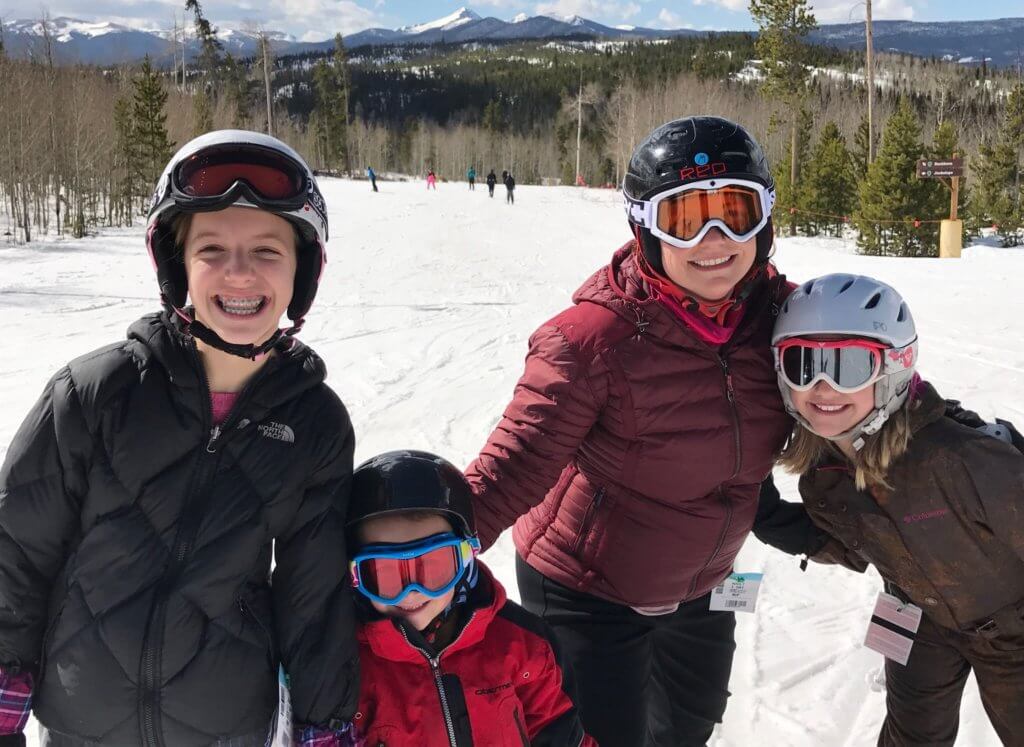
I recently returned from an amazing ski trip in Winter Park, Colorado with my three kids and my husband. In many ways, it was perfect: the mountains were beautiful, the weather was lovely and warm, and it was the first time that the five us got to ski together with no one in ski school! However, I realized how hard skiing is for me despite nearly perfect conditions and here’s why: A) I am afraid of heights and mountains are … well, high, and B) I have a huge fear of getting on a hill that is above my ability and too steep (see A). This stems from an experience my husband and I had while on vacation in Lake Tahoe a few years back.
It was our first-time skiing in the mountains and we quickly learned that the “blues” of Minnesota’s hills were much more like a light “green” in the mountain runs surrounding Lake Tahoe. We were staying near Heavenly Mountain Resort and decided to ski there. We’d spent the morning on a variety of “green” hills and we thought we had our plan for how to get back to the bottom all mapped out. To this day, my husband denies knowing that the fateful trail we ended up on was a “blue” and not a “green” but nevertheless, we ended up on a steep, icy “blue” run! Whether I panicked and then fell or the reverse, I’m not really quite sure. What I do remember was attempting to crawl sideways across the icy hill and dodging snowboarders (picture me in the game of Frogger) with one ski still on and the other sailing down the hill towards the woods.
The next thing I knew, there was an angel at my side in a ski patrol outfit. I don’t remember her name but in my memory, she had red curly hair and as she came to my rescue she said, “I’m sorry that trail wasn’t more clearly marked….” I held it together on the outside but on the inside, I burst into tears. Those two simple words–“I’m sorry,” for something that was not her fault–meant the world to me!
Now, was that hill marked as a “blue” and we just didn’t see it? Very possible or did one half of our pair know it and decide to keep it to himself to see if I could make it? Equally possible. Regardless of how we ended up on that run, was it this nice ski patrol lady’s fault that I ended up on a hill that was well beyond my ability? No! But did her apology show me empathy in that moment and help me maintain what tiny shred of dignity I had left whilst sprawled out on an icy hill? Absolutely!
“I’m sorry.” These two simple words can make such a profound impact, demonstrate empathy, and help someone maintain or recover some of their dignity that otherwise would have been stripped away in the situation. If this is true on a ski hill on vacation, how much more is it true for the patients and families we encounter each day?
In our work with frontline teams, we talk about how things don’t always go as planned. Sometimes “stuff happens” and as a team member, you walk right into the middle of a difficult situation with a patient that you had nothing to do with until this moment. I was working with a group planning a training workshop in St. Louis and one housekeeper spoke up. She gave an example that had happened earlier that week:
“I walked into this man’s room and I was just making chit-chat and asking about how his morning was going and how his breakfast was as I was cleaning his room. He kind of barked back at me that his ‘oatmeal was cold’ and his ‘coffee was gross’ and he didn’t ‘have any sugar for it anyway.’ So, I stopped and I said ‘I’m so sorry, that’s no way to start the day! Can I heat that bowl of oatmeal up for you? We have a microwave just down the hall. And how about I get you a new cup of coffee? We just brewed a fresh pot. Which kind of sugar do you like in your coffee and how many?’ It wasn’t my fault that his breakfast tray wasn’t to his liking, but by apologizing and offering to help fix it, I had a chance to help set his day back on the right track!”
What a great example of how two magical words can help to make a big difference to patients even in situations which we didn’t cause!
Join me next time when we’ll explore another key aspect for frontline staff that makes a difference to patients!
Here are a few resources and references on Service Recovery:
Customer Service Recovery: Apologizing To Customers Without Alienating Employees
